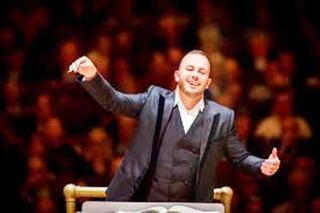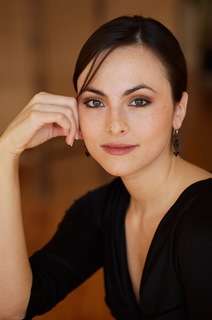|
Back
Dreams of Asia and the Sea New York
Isaac Stern Auditorium Carnegie Hall
06/03/2019 -
Claude Debussy: La Mer
Henri Dutilleux: Le Temps l’Horloge
Maurice Ravel: Shéhérezade – Daphnis et Chloé (Suite No. 2)
Isabel Leonard (Mezzo Soprano)
The MET Orchestra, Yannick Nézet-Séguin (Music Director)

Y. Nézet-Séguin
(© Hans van der Woerd)
“Music is the expression of the movement of the waters, the play of curves described by changing breezes.”
Claude Debussy (1862-1918)
“Time to get drunk! Don’t be martryed slaes of Time: Get drunk! Stay drunk! On wine, virtue, poetry whatever!”
Charles Baudelaire (1821-1867)
Stickless and scoreless and high-spirited, Yannick Nézet-Séguin transcended a program of French music last night into a laudation of music itself. The young conductor has inherited an orchestra which had become a technical phenomenon under James Levine. Now it was time for this playful Montreal artist to turn the MET Orchestra into a gorgeous plaything for our pleasure.
Growing up, New Yorker’s had felt the Metropolitan Orchestra was literally in the pits. The greatest conductors led them in order to lead the world’s greatest singers. But the Orchestra was still just a few steps above oom-pahs and trills for Verdi and Wagner.
Then came James Levine, who refused to accept the Metropolitan Opera Orchestra, changed it to The MET Orchestra, and made it an ensemble worthy of New York itself, a fitting competitor even for the New York Philharmonic.
Mr. Nézet-Séguin didn’t have to “train” them. From the first notes of La Mer–no, the first measures before the Debussy–he became a magician of the notes themselves.
Those notes “before” the buzzing sounds of La Mer were like the silences which “become” Beethoven’s Ninth or (in Furtwängler’s case) Schubert’s C Major. Mr. Nézet-Séguin didn’t begin the work, he turned unseen depths into shadows into light. Impossibly, while taking the piece at a sensible pace, he somehow made the solos–the most gorgeous flute in the opening, the trumpet at the end–almost echo their own sounds. Sounds which could be juicy or resonant, yet very much part of the whole ensemble.
This was not the radiant Technicolor ocean of Karajan or the meticulous droplet-by-droplet sea of Boulez, nor even the Hokusai static wave which graced Debussy’s original score. Rather it was a Manet painting, sometimes blurred, sometimes whirling, the crescendos and timpani almost frightening tumults, the solos like points of light on the canvas.
The conductor rightly deserves the credit, but I was stunned by the personality of The MET Orchestra itself

I. Leonard (© Jared Slater/J & J Photography)
Following that revelation, Isabel Leonard–possibly the most acclaimed mezzo-soprano since Callas–made her first appearance in the American premiere of Henri Dutilleux’ Le Temps l’Horloge (“Time and the Clock”). During his last years, the near-centurian had been chosen by Alan Gilbert as a prime composer for the NY Phil, and, like that other ever-young composer, Elliott Carter, he never lost his vivid inspiration.
This, his final work, set the words of four poets to music, three of them lyrical. And while the subject of time itself was a serious one (the philosophical poem Jean Tardieu’s The Future as Past without vocalization), Mr. Dutillleux was never without his sense of humor.
Ms. Leonard is a mezzo, but she has never been shy of reaching for the highest notes, and in Tardieu’s Time and the Clock and The Mask, she whizzed her way to the top. When singing how “the sound terrifies me and overwhelms me”, she was terrifying and overwhelmed. In Baudelaire’s Get Drunk, the elegant artist didn’t exactly stumble, (Ms. Leonard is as much an actress as a singer, but it’s difficult to see her as Jackie Gleason), but subtly her body went along with Dutilleux’ merry music to the wondrous words of Baudelaire, quoted above–and obviously a motto for the composer himself throughout his wonderful life.
The last work, from Ravel’s Daphnis et Chloé was, as expected, a crowd-pleaser for obvious reasons. Yes, the end was a controlled hysteria. “Daybreak” was subtle, radiantly atmospheric, with birds and winds and strings never quite in sync, keeping us all on edge. Still, that finale was pure show business, Mr Mr. Nézet-Séguin waving his hands in near-pantomime to the blistering finale.
Which leads to the penultimate work which is one of my personal Ravel favorites. Maurice Ravel never traveled to the Orient (or even the Middle East to which the opening “Asie” refers). Yet when I first heard a recording of Shéhérazade, sung by Régine Crispin while sitting in a cabin in northern Thailand, I literally did cry. For Ravel had captured the exotic romantic (and never quite true) Orient with an orchestral flavor which has never ever been surpassed. (Though Rimsky, in his own Sheherezade came close.)
The words by the great symbolist Tristan Klingsor were equally inspiring, giving images–admittedly dream-like images–that summoned up an Asia from Thousand and One Nights that came more from opium stories than reality.
I can never repeat that first hearing a few years from Thailand’s teakwood forests (rest in peace). Yet Ms. Leonard summoned up the bewitching atmosphere. Not only here but in the second poem, again with that great First Flute of The MET, and in the androgynous third poem.
Those three brought back singular memories. But for the deservedly full-house audience, Yannick Nézet-Séguin and his MET Orchestra provided equally singular and extraordinary joy.
Harry Rolnick
|